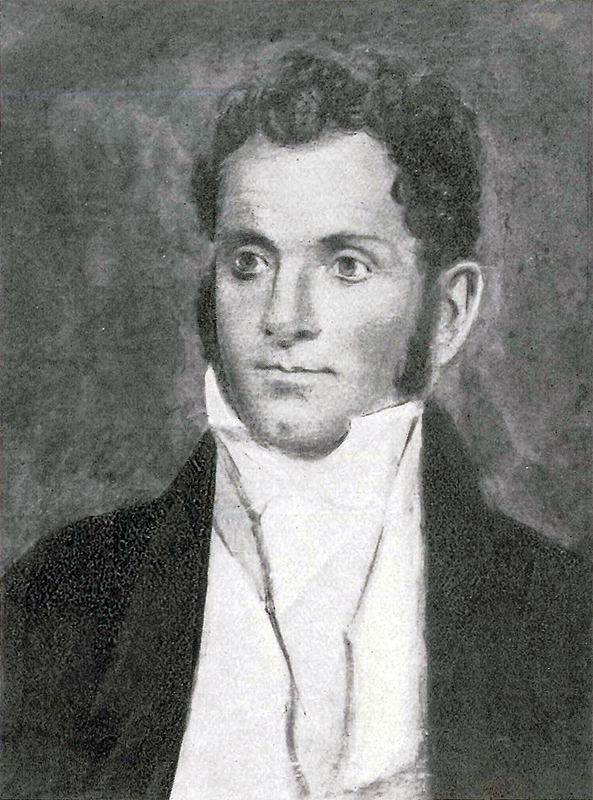Spencer Roane
| Spencer Roane | |
| Judge of the Court of Appeals of Virginia | |
| In office | |
| 1794 – 1822 | |
| Judge of the General Court of Virginia | |
| In office | |
| 1789 – 1794 | |
| Personal details | |
| Born | April 4, 1762 |
| Mahockney Plantation, Essex County, Virginia | |
| Died | September 4, 1822 |
| Warm Springs, Bath Co., Virginia | |
| Resting place | Warm Springs Cemetery, Bath, Virginia |
| Profession | Lawyer Judge |
| Spouse(s) | Anne Henry (1767 – 1799) Elizabeth Hoskins (1781 – 1825) |
| Relatives | William Henry Roane (son) Fayette Roane (son) Patrick Henry Roane (son) Eliza Roane (daughter) |
Spencer Roane (1762 – 1782), judge and political writer, was born in Essex County, son of William Roane, a burgess for Essex. Spencer Roane received his early education from Scottish tutors, and enrolled in the College of William & Mary about 1777.[1] There, he attended George Wythe’s law lectures, became active in Phi Beta Kappa, and developed a taste for literature.[2] Roane was considered a “prodigy of his generation” and “one of [George Wythe’s] most brilliant pupils.”[3] He continued his legal studies in Philadelphia and by reading Coke in his free time. Roane was admitted to the bar in 1782.[4]
Roane became a member of the Virginia House of Delegates in 1783-84, where he worked closely with Richard Henry Lee and served on committees with Patrick Henry and John Marshall.[5] He later served as an advisor to Governor Patrick Henry and as a state senator.[6] Throughout his political career, Roane remained a staunch Jeffersonian Republican and was opposed to the new Constitution, preferring instead a revision of the Articles of Confederation.[7]
In 1789 Roane began his judicial career as a judge of the General Court, a position he held until 1794 when the Virginia legislature elected him to the Supreme Court of Appeals.[8] There he was known for “attack[ing] each case eagerly and penetratingly” and for “clear and vigorous opinions.”[9] Roane’s decisions reflected his progressive, liberty-driven political ideology.[10] He was known for penning opinions that were “mindful of precedent and the law as science, but also keenly alert to the public policies of his own progressive age.”[11] Although Jefferson desired Roane to be Chief Justice of the Supreme Court of the United States, this was made impossible when John Marshall was appointed in 1800.[12]
Spencer Roane furthered his political ideologies in 1804 when he founded the Richmond Enquirer.[13] In it, under several different pen names, Roane advanced his opinions in articles that were “lengthy and not without extreme and abusive language.”[14] Although his articles were well-received by Jeffersonian Republicans, they greatly bothered the Federalists and “reinvigorated the extreme states-rights theory.”[15] Nevertheless, Roane did not consider his vision of powerful individual states as incompatible with union.[16]
Roane died in 1822 in Warm Springs, Virginia, but not before his son, William H. Roane, was seated as a United States Senator.[17]
References
- ↑ Dictionary of American Biography, s.v. "Roane, Spencer" by C. C. Pearson (New York: Charles Scribner’s Sons, 1963), 8:242.
- ↑ Ibid.
- ↑ Alonzo Thomas Dill, George Wythe Teacher of Liberty (Williamsburg, Virginia: Virginia Independence Bicentennial Commission, 1979), 51.
- ↑ Dictionary of American Biography, "Roane, Spencer," 642.
- ↑ Ibid.
- ↑ Ibid.
- ↑ Ibid
- ↑ Ibid.
- ↑ Ibid.
- ↑ Ibid.
- ↑ Ibid.
- ↑ Ibid.
- ↑ Ibid.
- ↑ Ibid., 643
- ↑ Ibid.
- ↑ Ibid.
- ↑ Lyon G. Tyler, "Roane Family," William and Mary Quarterly Historical Magazine 18, no. 4 (April 1910), 267.
